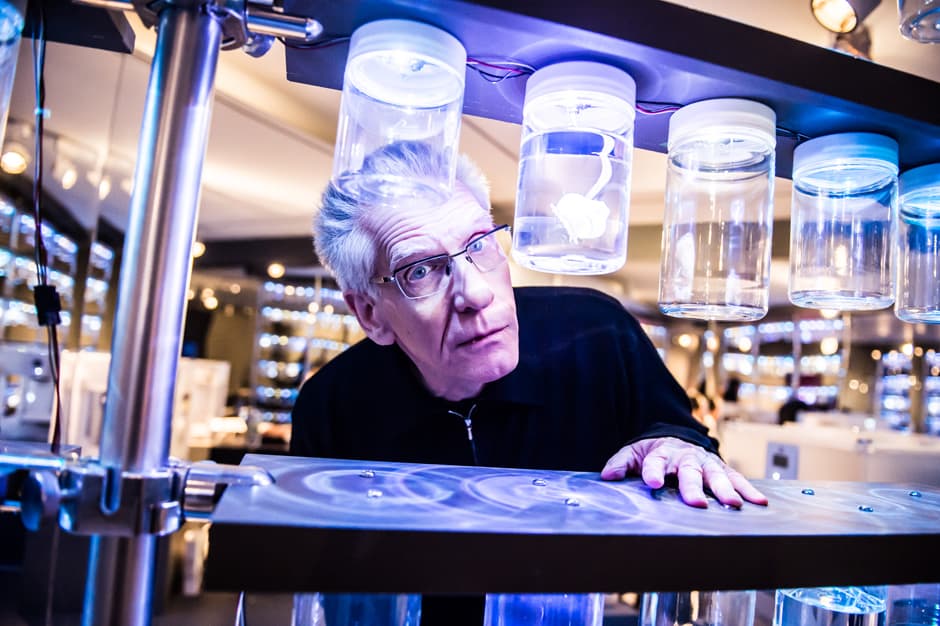As I walked into the high-end café in Toronto’s fashion district where I was to meet legendary film director David Cronenberg, my brain was flooded by a series of unwelcome flashbacks from his filmography. Serving as a highlight reel of every horrifying and cringe-worthy moment from his vast body of work, my mind raced from Viggo Mortensen smacking a dude in the face with a coffee pot in A History of Violence, to Mia Waskiowska ruthlessly bashing in Julianne Moore’s head with a movie award in Maps to the Stars. Needless to say, this did not help my nerves when approaching a man who is essentially a demi-god of cult films.
Last September, Cronenberg’s most recent film, Maps to the Stars, was released at various different film festivals in North America and Europe. Known for his compelling yet brutally horrific films, Cronenberg’s most recent movie, about the extremities of celebrities’ lives in Hollywood, was as intense and stressful as his previous body of work would lead you to expect. Maps to the Stars follows two child actors and a struggling actress in the heart of Hollywood as they deal with their over-the-top experiences in the dream-like world of the film industry. Ranging from ghosts to a series of weirdly incestuous themes amongst close family members, certain moments in Maps to the Stars come across as so over-the-top that it has been considered by critics to be an overt satire of the goings on within the film industry nowadays. But to this, Cronenberg seems to disagree.
“For some, this movie is more like a docudrama,” Cronenberg said. “We thought this was much too real to be considered a satire. There’s a sense that life in Hollywood is like a fever dream, and everyone’s always in a state of high anxiety. Bruce [Wagner, the screenwriter of Maps to the Stars] has told me that every conversation in this movie, he’s heard in real life.”
The movie mostly revolves around a preteen child actor named Benjie Weiss (Evan Bird), who is in the midst of overcoming a severe drug addiction and is playing the lead role in an upcoming Hollywood production. On the other end of things, staggeringly wealthy actress Havana Segrand (Julianne Moore) is struggling to get a role in the remake of her deceased mother’s film, despite having gone through years worth of verbal and physical abuse from the older Segrand. As their worlds collide, and the various incestuous tropes (which I will spare you) spill out, the whole plot seems to become significantly more outrageous until it is determined by the viewer that this must be some sort of dark practical joke.
“The humour comes from within,” Cronenberg said, adding, “We’re talking about the absurdity of the human condition. The idea of Hollywood being incestuous is in the sense that it’s an enclosed ecosystem of ideas with no oxygen, with no new blood, and with no new ideas. Everything just keeps circulating and getting weaker and weaker as we see sequel after sequel. It was pleasing as a metaphor for what’s wrong with studio filmmaking.”
Being a member of this maniacal Hollywood system himself, Cronenberg can testify to what goes on in the movie industry. “I’ve had some really bizarre meetings with studio executives like these,” he said. “Unfortunately, I can’t tell you what they were saying, but I can tell you that they were all equally as extreme, if not more extreme than what you hear in the movie.”
Apart from what goes on in Hollywood, Cronenberg also weighed in on what goes into transforming a script into a motion picture, as well as what it’s like to work with big name actors.
For Cronenberg, writing a screenplay and actually making a movie are entirely different. In terms of the screenplay, “you’re still just imagining it. It’s a feeling.” When asked about getting the right performances out of the actors, he says that “you, as a director, would be doing a disservice to the actor and yourself if you did not completely give yourself over to the actor you’ve got. Nothing you’ve imagined up to that point matters, it’s about what you get on the set. Use what you have, and have no regrets.”
Maps to the Stars is a movie that, no matter how outrageous and over-the-top it may seem on the outside, has genuinely truthful characteristics lying underneath, that will grow on you as the movie becomes harder and harder to get out of your head. Naturally, Cronenberg closes off the interview by reminding us that “of course, in order to make this movie, I had to feel that no one else could do it or would do it.”



